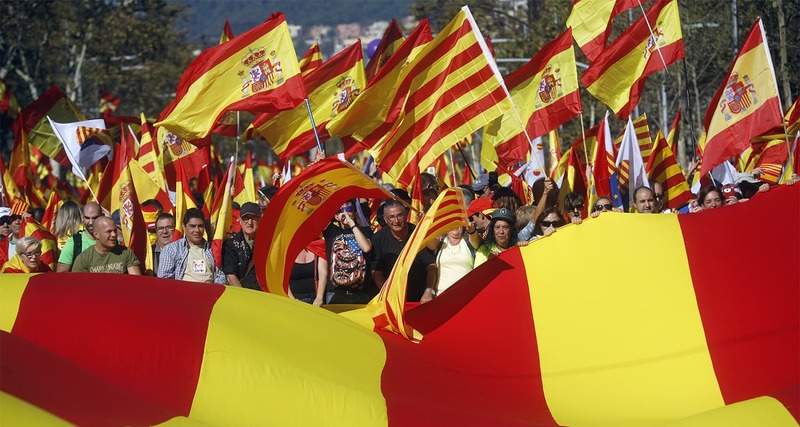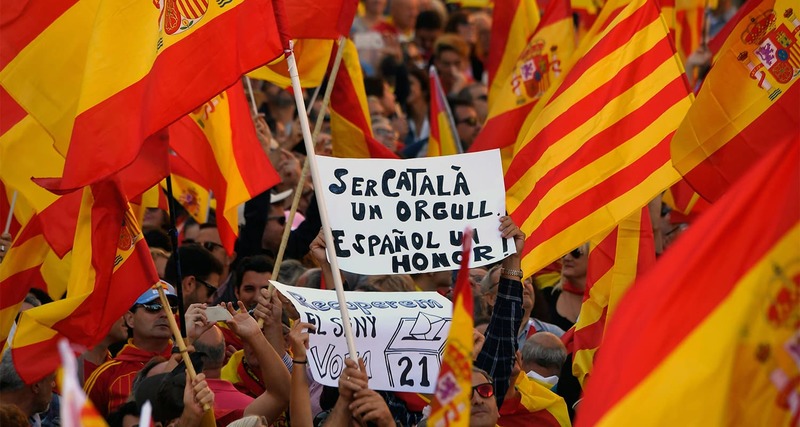Defenders of Spanish unity massed in the streets of Catalonia's capital Barcelona on Sunday, waving national and European flags and chanting “Viva Espana” two days after regional lawmakers voted to sever the region from Spain.
Protesters flocked in their tens of thousands through Barcelona's streets, in a sea of red-and-yellow Spanish flags, brandishing placards reading “De Todos” (It belongs to all of us).
The stand-off has plunged Spain into its worst political crisis in decades and raised alarm in Europe.

“We are all Catalonia,” proclaimed a massive banner as the crowd chanted “Prison for Puigdemont”, and “Long live Spain”.
Secessionist leader Carles Puigdemont and his regional executive were axed by the central government on Saturday, a day after Catalan lawmakers voted to declare the region of 7.5 million people a republic.
Prime Minister Mariano Rajoy also dissolved the regional parliament, and called December 21 elections for a new one.
“I am enraged about what they are doing to the country that my grandparents built,” said protester Marina Fernandez, a 19-year-old student from Girona, a separatist stronghold.

In her hometown, she cannot speak out for Spanish unity or “leave my house with the Spanish flag,” she told AFP.
As the march got underwayay, the deputy president of the deposed Catalan government lashed out at Madrid over what he called a “coup d'etat”.

“The president of the country is and will remain Carles Puigdemont,” the axed leader's deputy Oriol Junqueras wrote in Catalan newspaper El Punt Avui.
Junqueras used the word “country” to refer to Catalonia, and signed off as the region's “vice president”.
“We cannot recognise the coup d'etat against Catalonia, nor any of the anti-democratic decisions that the PP (Rajoy's ruling Popular Party) is adopting by remote control from Madrid,” he wrote.
'They are dictators'
Flor Pena, a 59-year-old originally from the northwestern autonomous region of Galicia, described the separatists' actions as “shameful”.
“The thing to do now is to beat them at the polls.” Miguel Angel Garcia Alcala, 70, travelled from the town of Rubi, 22 kilometres from Barcelona, for the march, held near where tens of thousands of people had celebrated the new “republic” with song, wine and fireworks just two days earlier.

“I do not agree with these people holding us by the hair,” Alcala told AFP. “It is illegal what they have done... They are dictators.”
For 35-year-old office worker Silvia Alarcon, the separatists “live in a parallel world, a little surreal. I am angry that they claim to speak for all Catalans when they do not.”
'Viva Espana!'
The Catalan crisis was triggered by a banned independence referendum on October 1 shunned by many, and marred by police violence.
Then on Friday, Catalan lawmakers passed a motion, by 70 votes out of 135 in the secessionist-majority regional parliament, to declare the region of 7.5m people independent from Spain.

Rajoy responded by deposing the regional government, dissolving its parliament, and calling December 21 elections to replace them.
Deputy Prime Minister Soraya Saenz de Santamaria, was temporarily put in charge of administering the rebel region.
Ines Arramadas, leader of the Ciudadanos main opposition party in Catalonia, told journalists at the march that a majority of the region's inhabitants wished to “recover our future”.
“Today the silenced majority of Catalonia returns to the streets. It once again shows, with dignity and respect, that the majority of Catalans feel Catalan, Spanish and European,” she said, a day after thousands of people took part in a similar march in Madrid.

Representatives of Rajoy's conservative PP were also at Saturday's rally, in what for some resembled the start of an election campaign.
An opinion poll published in centre-right newspaper El Mundo Sunday said separatist parties would lose their majority in Catalonia's regional parliament if elections were held today.
'Democratic opposition'
As prosecutors prepared to file charges of rebellion against Puigdemont next week, he called on Saturday for “democratic opposition” to Madrid's power grab ─ the first curtailment of regional autonomy since Francisco Franco's brutal 1939-75 dictatorship.
Roughly the size of Belgium, Catalonia accounts for about 16 per cent of Spain's population and attracts more tourists than anywhere else in the country.
It produces a fifth of Spain's economic output ─ equivalent to that of Portugal.
Before the upheaval, Catalonia enjoyed considerable autonomy, with control over education, healthcare and policing.
But while fiercely protective of their language, culture and autonomy, Catalans are divided on independence, according to polls.

Spain enjoys the backing of the United States and allies in a secession-wary European Union still reeling from Britain's decision to leave its fold.
Many fear the economic impact as the standoff drags on, with some 1,700 companies having moved their legal headquarters out of Catalonia to date.
Later on Sunday, the Real Madrid football club, supported by Rajoy, will face Puigdemont's favourite, Girona, in the Catalan side's home stadium.

Comments
Post a Comment